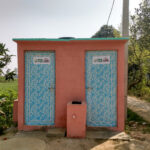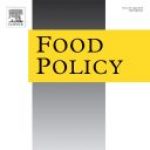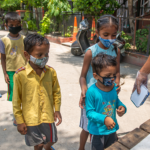Tag: Payal Seth

Information Is Key to Ending Open Defecation
This policy brief presents the results of a study of the impact of toilet subsidies and behavior change communications on the practice of open defecation in rural India. TCI researchers conducted a cluster randomized trial of villages in Uttar Pradesh, providing one group of villages...

Information Is Key to Making India Open-Defecation-Free
Solving a problem like open defecation is not as simple as installing toilets. In 2019, after decades of work, India scored a major developmental victory by providing 600 million people with access to toilets. But while the toilets were built,…

Addressing Information and Credit Barriers to Making India Open Defecation Free and Improving Child Health: Evidence from a Cluster Randomized Trial in Rural India
Abstract Read a policy brief based on this study. Background Open defecation (OD) remains a significant public health challenge in India, contributing to adverse child health outcomes. Eliminating OD and improving child health necessitates both universal access and adoption of toilets. Despite the success of...

These Are the Keys to Promoting Artificial Insemination for Livestock
With the world’s population growing and dietary preferences changing, rising demand for animal-based food products like milk presents an opportunity for farmers in the developing world. Artificial insemination can help these farmers improve their productivity and increase their incomes, so…

Understanding the Determinants of Farmers’ Adoption of Artificial Insemination in Livestock
Abstract Read a policy brief based on this study. The adoption of artificial insemination (AI) in livestock is a crucial factor in enhancing breeding efficiency, livestock productivity, and income opportunities for farmers. However, the adoption of AI among farmers can vary significantly, influenced by a...

Women’s Empowerment and Intra-Household Diet Diversity Across the Urban Continuum: Evidence from India’s DHS
Abstract Read a policy brief based on this study. Women’s empowerment has been associated with improved nutritional outcomes in various settings. However, the gains from empowerment do not necessarily accrue to different members of the same household in the same manner. Furthermore, the relationship between...

Empowerment Programs Can Improve Nutrition of Women Left Behind by India’s Urban Transformation
New research from the Tata-Cornell Institute for Agriculture and Nutrition (TCI) reveals that Indian efforts to improve household nutrition through women’s empowerment could have a greater impact with a more targeted approach that takes into account different levels of urbanization. …

Improving Livelihoods Through Enhanced Goat Breeding
Goat rearing holds significant promise for smallholder farmers in India, offering resilience and income generation even during crop failure. However, reliance on natural breeding practices limits productivity due to issues like inbreeding and disease transmission. Artificial insemination presents a viable…

Did the COVID-19 Lockdown Reverse the Nutritional Gains in Children? Evidence from Rural India
Abstract Read a policy brief based on this study. To address the missing link that goes beyond the changes in dietary consumption and food expenditures to assess the impact of the pandemic on child undernutrition, specifically anthropometric outcomes, this paper uses primary panel data (pre-...

COVID-19 Pandemic Linked to 14% Increase in Underweight Children in India
The nutrition of Indian children suffered dramatically during the COVID-19 pandemic, according to new research from the Tata-Cornell Institute for Agriculture and Nutrition (TCI) that found a sharp rise in underweight children.
In a study published in Economic and Political…

